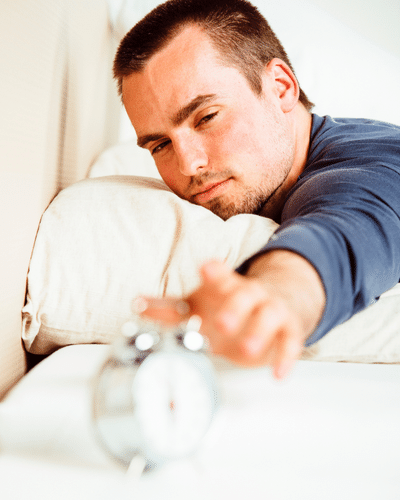On Saturday 26th March the clocks will ‘Spring forwards’ and the UK will switch to Daylight Saving Time (DST).
The current understanding amongst sleep researchers is that DST can have negative effects on sleep quality, which impacts our training and our ability to recover from injury.
Our circadian rhythms (physical, mental, and behavioural changes that follow a 24-hour cycle) take cues from light and dark in our environment, affecting how sleepy or alert we feel at different times.
Why Daylight Saving might not be great for our brains and bodies
The 1-hour shift results in less exposure to light in the morning and increased exposure to evening light.
This results in a tendency to go to bed later, resulting in a small but significant amount of sleep loss at this time of year.
The European Biological Rhythms Society (EBRS), European Sleep Research Society (ESRS), and Society for Research on Biological Rhythms (SRBR) published a joint statement, declaring that permanent standard time is the best option for public health.
The American Academy of Sleep Medicine (AASM) released a similar statement, but despite these recommendations, the UK will still be making that adjustment on 26th March.
Sleep to support training and recovery
Most of us experience periods of disrupted sleep from time to time, but prolonged lack of sleep can have severe consequences for our health – both physical and mental. As we struggle to balance our many responsibilities at work and at home, it’s worth remembering that sleep is not a “luxury” part of self-care! It is a basic human need which performs a number of vital functions in our bodies. Getting enough sleep, and enough good quality sleep, is necessary for:
- Facilitating learning and memory
- Energy conservation
- Cognition
- Recovery of muscles and bones
- Strengthen immune system
Whilst we may not have any choice in the matter, there are things you can do to improve the quality of your sleep, as Chartered Physiotherapist Amanda Sussman explains…
‘Sleep hygiene’ is the combination of your bedroom environment and daily routines and habits during the day and before you go to bed, which promote consistent, quality sleep. Sleep hygiene is important to help you:
- improve your mood, concentration and memory,
- maintain a healthy weight,
- lower your risk of serious health conditions.
Rest and recovery are an important part of training
For athletes at all levels, short-term recovery is crucial to maintaining and improving performance and preventing injury.
Short-term recovery (sometimes called active recovery) may include a lower intensity cool-down phase after run or workout, rest days built into your training plan, as well as low-intensity exercise like walking, pilates or yoga.
Replenishing energy and fluid lost during exercise is also essential to fully recover.
Recovery requires adequate sleep
Research suggests deep sleep is particularly helpful for improving athletic performance, because this is when growth hormone is released. Growth hormone stimulates muscle growth as well as repair, bone building and fat burning.
A study conducted in America by the National Sleep Foundation in 2013, found that regular exercisers report getting better quality sleep. While those who exercise vigorously reported the best sleep quality, even light exercisers reported better sleep than those who do not exercise at all.
Ten tips from Amanda to improve your sleep hygiene
DO – Try and go to bed and get up at the same time every day – even on weekends
DO – Create a restful bedroom environment and a relaxing bedtime routine
DO – Only use your bedroom for sleep, sex and getting dressed
DO – Eat light meals before going to bed
DO – Get regular exposure to sunlight
DO – Do something you look forward to in the morning to motivate you to get up
AVOID – Using electronic devices before going to bed
AVOID – Having any stimulants after lunch (switch to decaf tea and coffee after 2pm!)
AVOID – Taking naps during the day
AVOID – Forcing yourself to go to sleep – get up and do something until you are sleepy
Recommended reading
Amanda says:
“Have a read of the AASM How to Sleep Better e-book. The AASM website also has great blogs and resources to help you maximise the quality sleep you’re getting.”
For information and advice on how the Elite Physical Medicine team can support your training, rest and recovery, please contact the clinic.




